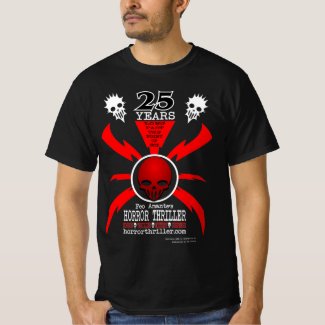 |
 |
Review by E.C. McMullen Jr. |
|
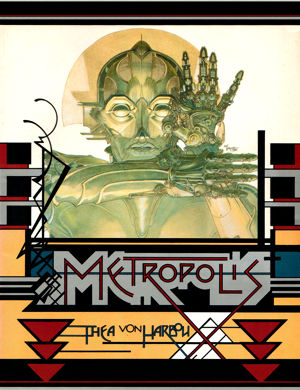
by Thea von Harbou Released: Jan. 1, 1925 USA Release: March 1988 Illustrated by Michael W. Kaluta The Donning Company PUblishers / Starblaze $24.95 US / $27.95 CAN ISBN: 0-89865-518-8 |
|||
In the world's greatest city of Metropolis, Freder is the son of the world's wealthiest man, and possibly the only child.
As such there is nothing, no presents, trinkets, young men or women or servants that are not showered upon him, wait upon him, cheer as he wins in sports, laugh at his jokes, accompany him wherever he wants to go and leave him when he bids it.
This is the only life Freder has ever known and this artifice was created by his rich and powerful father to always remain this way. The son of Joh Fredersen, Master of Metropolis, must never know sorrow, anguish, loss, or grief.
The very things that scarred his father and isolates him from joy. Joh can only live vicariously through his son. And his son must never know this.
All of Freder's friends are the sons of wealthy and powerful men: oligarchs whose fortunes are directly tied to, and just beneath the value of the Master of Metropolis, Joh himself.
But on this day, the day the novel begins, as Freder delighted in life with his friends at The Club Of Sons: a heavily guarded and protected district of Metropolis, a soul chilling thing occurred.
The doors to the Eternal Gardens opened and in came children.
These were not human beings like Freder had ever known or imagined, as he was never allowed to know such things.
"They were all holding hands. They had dwarves' faces, grey and ancient. They were little ghost-like skeletons, covered with faded rags and smocks. They had colorless hair and colorless eyes. They walked on emaciated bare feet."
To someone like Freder, they might as well be aliens from an unknown planet, come to earth.
How could such oppressive suffering could be etched into faces so young?
The children were led into the room by a young woman with "The austere countenance of the Virgin. The sweet countenance of the mother."
Then, without the slightest hint of fashionable mask or make-up on her person, without a trace of mockery or condemnation in her voice, she said to the children, "Look, these are your brothers."
Then she stretched out her arms to the friends at The Club of Sons, encompassing them all and said to them, "Look, these are your brothers."
Everything Freder thought he knew of the world ended that day. Everything he knew of his own identity ended. On this day, because Freder knows beyond question his father is the most powerful man in Metropolis, so Freder knows that such things cannot exist unless his father allows it.
The book begins with Freder overcome by emotions he's never known. Sorrow, anguish, grief, and none of it for himself, but compassion for those he saw only hours ago.
He looks about at all the opulence he'd always considered the normal of everyone's life, and its all scorched. His world is forever destroyed by a truth he could never dream.
"Look, these are your brothers."
The young man who can dance every dance, win every race, win every game, and play the most complex music, is left helplessly appalled by the ugliness of his own life that he once found so beautiful and perfect only hours ago.
When he sees his servants he no longer sees his friends, only his watchers and guards. Freder always believed he was free, but now knows for a fact that he was always kept in a prison like a cherished pet. An entire planet and the creatures that live on it were hidden from him.
The servants pushed the girl and children out. The Major Domo himself was "white with rage" over such a thing happening, yet all refused to answer Freder's questions.
"Who is that girl? What's her name? Where do such people come from?"
So begins the tale of the adventures of Freder. He's flamboyant, dramatic, vain, presumptuous, pretentious, over-emotional, and naive - everything his father raised him to be.
He's a cultured fool but he's not stupid. He was brilliant enough since early childhood to invent, by himself, the magnificent organ that he also taught himself to play. He did that on his own. That remains the one truth left in his life.
Now Freder, who knows nothing of the world, wants to change it. He's dangerously unaware that his actions can have unintended consequences, dangerously unaware that the carefully crafted world of illusions his father created is already changing beneath his very feet.
This change is how the young woman and children were able to get through all the doors, past all the security, and find their way into the Eternal Gardens. Unseen by the eyes that live far above, the foundations beneath this city are cracking.
The once mighty city of Metropolis is starting to crumble.
Every ten hours Metropolis screams. it is the voice of Metropolis and Freder has heard it all his life. He never considered what it meant. All cities have them. The Voice of New York. The Voice of London. In every book and every movie of his carefully curated life, it's just something cities do.
Only now does he think there's more to it.
He goes out onto his balcony and looks down into the city. Freder has always heard the voice and seen the people move below. He always thought they were moving to wherever they desired. Wherever their whims propelled them. Now he imagines those people far below aren't going somewhere because they want to, but because they are forced to. They're the Mothers and Fathers of the children, his "brothers", and the voice of Metropolis calls them to feed it.
How they "feed" the great city he has no idea, but if people look and live like his "brothers" it can't be any good.
Because he doesn't know any better, Freder goes to his father, Joh, to confront him with questions.
Joh, however, has eyes everywhere, and is expecting his son.
Freder can't get the words and images he experienced out of his head. To escape the ever mindful eyes of his watchers and guards, he orders them away and runs to places he's never gone. To escape them he chooses a long route to his father, one that takes him deep beneath the city and past the machines that run Metropolis. He sees people who could be the parents of such children, and is staggered by this new knowledge.
When he enters the brain pan of Metropolis, where his father works tirelessly day and night on his passion - the city - Freder is overwhelmed beyond all reason and he finds himself asking his father questions he never asked before.
Joh Fredersen patiently indulges his son, as in his own way he loves his child. He loves his son so much that he never wants him to suffer the hideous torments that once plagued Joh until, in stubborn desperation, he rose up to crush all before him or die trying.
TRIVIA It's said that any hero that lives long enough becomes a villain. Prior to the war, the NAZIs, through Joseph Goebbels, offered Fritz Lang anything a movie director could want. He left Germany because he didn't want to make movies that sympathized with NAZIs (debateable). Thea von Harbou, on the other hand, stayed. Like her fictional heroes, Maria and Freder, she honestly thought she could be the heart between the cold mind of the Rulers and the coarse Hands of the Workers. The NAZIs made a deal with her as well, and where on planet earth would she ever find another country that offered such respect to women? Certainly not in America, where her husband ran to after they split. So Fritz Lang and Thea von Harbou divorced. Then in 1938 Thea married a man 17 years her junior, her lover and Screenwriter Ayi Tendulkar. Thus making Thea possibly the only NAZI to marry outside of her race, let alone openly flaunt it. Franklin Delano Roosevelt, president of the United States of America, found himself stymied by liberal isolationists and conservative neutralists, neither of whom had a problem with Adolf Hitler. Everything you know about the horrors of NAZI Germany came after their fall, and the allied soldiers who went into the concentration camps, and the discovery of the NAZI books, ledgers, strategies, films, and eyewitness testimony. By the time the full scope had been found (though before it had all been researched and documented for the Nuremberg Trials), enough high ranking NAZI officers had escaped to countries like Brazil. What did NAZIs look like before the war? Well, how do you feel about The Associated Press? The New York Times? Bayer? BMW? Fanta? Ford? Hugo Boss? IBM? ITT? Kodak? Siemens? Volkswagon? 10 Famous Companies That Collaborated With Nazi Germany Leni Riefenstahl's Birthday – or – How Hitler Rose to Power. |
Freder has seen things he was never meant to see and Joh's icy cruel wrath will find all who failed him and dismiss many, giving them no other place to go, finding no one, who would dare hire one, who incurred the anger of the Master of Metropolis.
Freder doesn't understand the answers his father gives him and believes they are more illusions made to put him back in his cage. But there's no going back once you've eaten from the tree of knowledge.
Freder's adventures will cause many mistakes, harm many people, and he'll be beaten down again and again - another horrible surprise: Losing. He's not as fantastically strong as he knew he was. He isn't the cunning fighter he knew he was. Common people can outrun him. Freder doesn't grasp the concept of betrayal or the irresistable allure his wealthy life has to someone who could only see it from below and looking up.
Joh calls upon his former friend, now lifelong enemy, Rotwang. The two men have a deep history with each other. Rotwang is the man who created the future, but Joh is the man who bought and rules it. Rotwang does Joh's bidding only because Joh allows him to live and work on his inventions. Joh is not foolish enough to think that Rotwang doesn't constantly consider revenge, so he keeps his enemy close and busy on ever tinkering, improving the machines that Joh despises yet needs.
On this day, Rotwang, flush with the excitement of success, shows Joh his latest invention. Something that will render all of his other amazing inventions obsolete. He has created a living machine. Once he builds enough they can build themselves and in their thousands replace the human workers with machines that never tire, never sleep.
At first, Joh can't stomach the idea of machines replacing humans.
Meanwhile Freder has once again escaped his watchers by going down into the depths of the machines. There he trades places with a worker. He wants to see for himself what this life is like.
He discovers that the young woman is Maria and she lives in the depths with the workers. But she is also fomenting revolution. Freder, knowing his own anger, is astounded that Maria desires not a transfer of power, only the peace of liberty and plenty. To work in safety, and have enough time to seek one's own happiness.
The workers who listen to her want that too, but they only see destruction and anarchy as the means to attain it. Maria is all the stands at the door between a better life, and utter ruin.
When Rotwang figures things out, he finds and shows Joh one of these meetings. From their secret view, Joh doesn't see that his son Freder is down among the workers, dressed as one of them.
Joh only sees Maria as a threat and wants to take her power over the workers. Rotwang, however, sees her as a useful tool to his own plans.
And Freder?
For the first time in his life Freder has fallen in love.
Without the central character of Freder, whose father cultivated him like a Japanese Bonsai tree, Harbou's prose would come off garishly purple. This is how Thea brought us into the mind, and so the world of Freder where we explore this new and perilous world with him through the limits of his own experience.
The inspiration for METROPOLIS didn't come from Harbou, but from her husband, movie director, Fritz Lang. Fritz sailed from Europe to America in 1924, where he stood on the ship and marveled at New York City at night. A place where electric lights move and dance across the buildings and, seemingly, the sky.
He found NYC both amazing and oppressive to his old world Germanic view. Thea von Harbou, however, found it inspirational.
Thea was so inspired in fact, that METROPOLIS, with its great visionary sweeps of imagination, and without indulging in supernatural fantasy, is a world based on a reality of technology and science, with machines both enormous and miniature.
Those fixtures are window dressing over Harbou's story, however. METROPOLIS is a heartfelt emotional boilermaker of young first love and all of its innocent and preposterous desire and passion navigating through the traps of a Venn Diagram of overlapping conspiracies, each set into motion by the deep-rooted infrastructure of powerful and brilliant people, that blend and crash to create an outcome that no one foresees or wants.
The book I reviewed was illustrated by the great comic artist, Michael W. Kaluta. While his work is heavily influenced by the movie's Production Designer, Erich Kettelhut, as well as the robot creator, Walter Schulze-Mittendorff, Kaluta brings his own style to their work, enhancing Harbou's story without distracting from it.
With Kaluta we see scenes that only exist in the novel, never filmed.
Think of how many Science Fiction stories, even ones that began in the new millennium, are outdated by time. Their fans graciously refer to them as Alt-History books in the hopes of relevance. In ways both exciting and scary, for better and worse, METROPOLIS remains our potential future.
Five Bookwyrms.
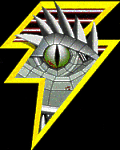




This review copyright 2023 E.C.McMullen Jr.
| HERE WEAR ONE OF MINE | |
| YOU MIGHT ALSO ENJOY (Sub-Section: EVIL INDUSTRIALISTS) |
||
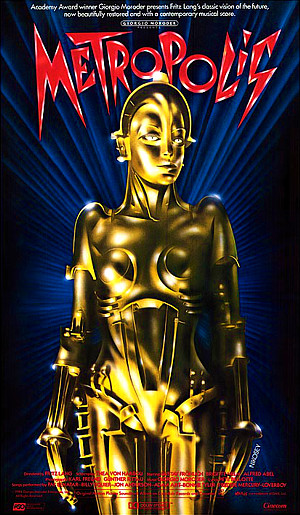 |
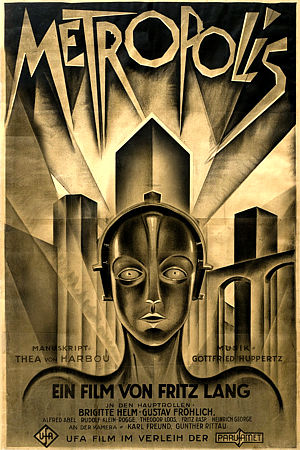 |
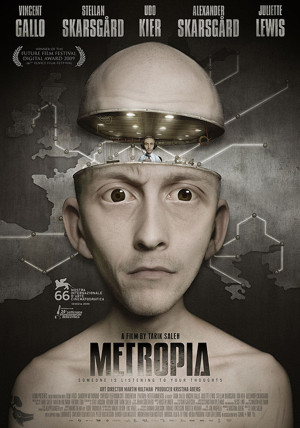 |
| METROPOLIS - 1984 MOVIE REVIEW |
METROPOLIS MOVIE REVIEW |
METROPIA MOVIE REVIEW |
| FEO AMANTE'S HORROR THRILLER Created by: E.C.MULLEN JR. |
| COME FOLLOW ME @ Amazon |
| ECMJr |
| Feo Blog |
| IMDb |
| Stage32 |
| YouTube |
| Zazzle Shop |

